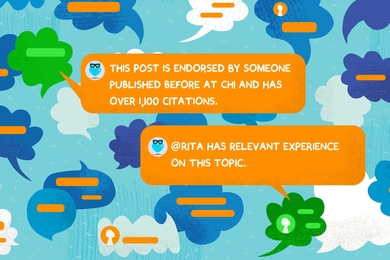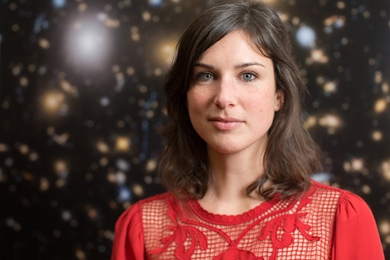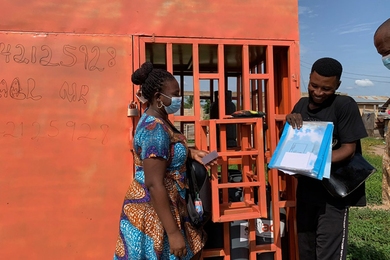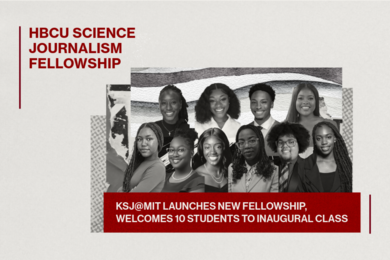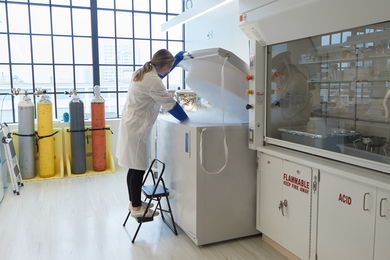CAMBRIDGE, Mass. -- The son of German physicist Werner Heisenberg joined actors from the play "Copenhagen" and two noted physicists in an MIT symposium Monday night that explored the implications of a secret meeting between Nobel laureates Heisenberg and Niels Bohr.
"New Thoughts on Interpreting 'Copenhagen,'" moderated by MIT Associate Provost for the Arts Alan Brody, attracted a standing-room-only audience of 400 to Wong Auditorium, despite a driving rainstorm. The overflow crowd of more than 100 watched on closed-circuit video in the adjoining lounge.
Jochen Heisenberg, a physics professor at the University of New Hampshire, and Gerald Holton, an emeritus professor of physics and the history of science at Harvard University, differed on the reason for the 1941 meeting in Copenhagen between Bohr and Werner Heisenberg on which the show is based.
One theory for the visit explored by playwright Michael Frayn is that Werner Heisenberg, who headed the German nuclear power program, wanted the Los Alamos scientists to agree that scientists on both sides would try to convince their leaders to scrap the atomic project. In the play, Bohr rejected this proposal with hostility, assuming that the Nazis were already working on a bomb. Bohr later played a role in the Manhattan Project that developed the atomic bomb for the United States.
Heisenberg said his father visited Bohr in Copenhagen because he was concerned for his friend's safety and wanted to assure that Bohr's institute in occupied Denmark would remain under Danish control. Photographs of Werner Heisenberg flashed on the overhead screen during his talk.����
He said his father was discreet during his discussions with Bohr because he knew both men were under surveillance by the Nazis. "He was trying to say these things between the lines, the way he was used to communicating inside Germany," said Jochen Heisenberg. "He felt this was essential for his own survival, whereas Bohr was not used to this practice." Werner Heisenberg, his son said, later acknowledged that he was too cautious in the discussions.��
He described his father as a German patriot who did not join the Nazi party. Werner Heisenberg was "appalled" at the Nazi atrocities and anti-Semitism, his son said, and clashed with the Nazis over science policy. He suggested that his father discouraged the regime from pursuing the atom bomb project, saying the timetable was not realistic -- as opposed to making an argument on moralistic grounds, which would have been rejected.
Werner Heisenberg devoted himself to rebuilding and shaping science in Germany after the war. "He continued to oppose arming Germany with nuclear weapons," Jochen Heisenberg said.��
Holton said Bohr stated politely in letters written to Heisenberg -- but never sent -- that his recollections of the conversations differed from those Heisenberg stated in a letter to Swiss journalist Robert Jungk, portions of which were included in Jungk's 1958 book "Brighter Than a Thousand Suns."
"I owe it to you to remind you how your memory has failed you," Holton said Bohr wrote. Bohr went on, "I remember every word." Drafts of the unsent letters written from 1957 to 1962, when Bohr died, were recently released by Bohr's family. In the letters, Holton said, Bohr wrote that he remembered Heisenberg stating Germany would win the war and that he did not wish to be on the losing side.
Holton said Bohr and Heisenberg met several times after the war at conferences and talked about the secret meeting. "They never resolved their differences," Holton said.
Thus, Holton said, "Bohr did not send a letter because he felt the language was too strong. Heisenberg, who had reason to suppress his thoughts, did send a letter. Out of this they made a play."��
Jochen Heisenberg and Holton were joined on the panel by the entire cast of the show: Hank Stratton, who plays Werner Heisenberg; Mariette Hartley, who portrays Bohr's wife Margrethe; and Len Cariou, who portrays Bohr. MIT Professor Emeritus Laszlo Tisza, who knew both Heisenberg and Bohr, also joined the panel.
While not directly addressing what was discussed at the secret meeting, Tisza said he believed Heisenberg's research group ran out of time when the war ended. "The idea that they didn't get it because of moral reasons is untenable," he said.
The actors said they were honored to be in a show that sparked such discussions.
Brody summed up the evening by by quoting the late MIT physicist and protege of Bohr's, Victor Weiskopf, who said, "There are two major theories on how the world began: Haydn and the Big Bang. You've got to know both of them."
The symposium was hosted by the MIT Office of the Arts and Boston's Goethe Institute. The Tony Award-winning play "Copenhagen" runs through Sunday, May 19, at the Colonial Theater in Boston.

